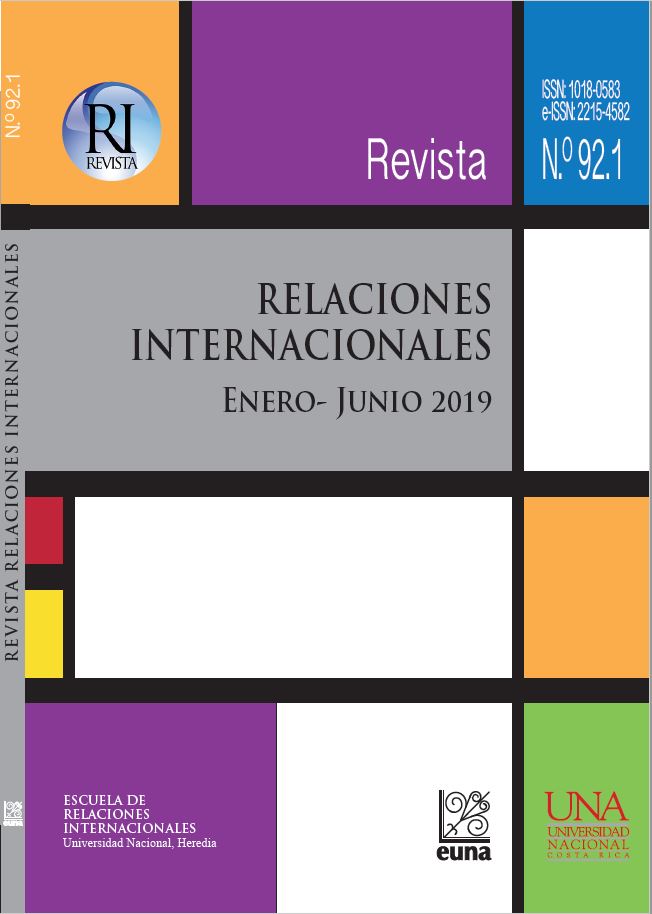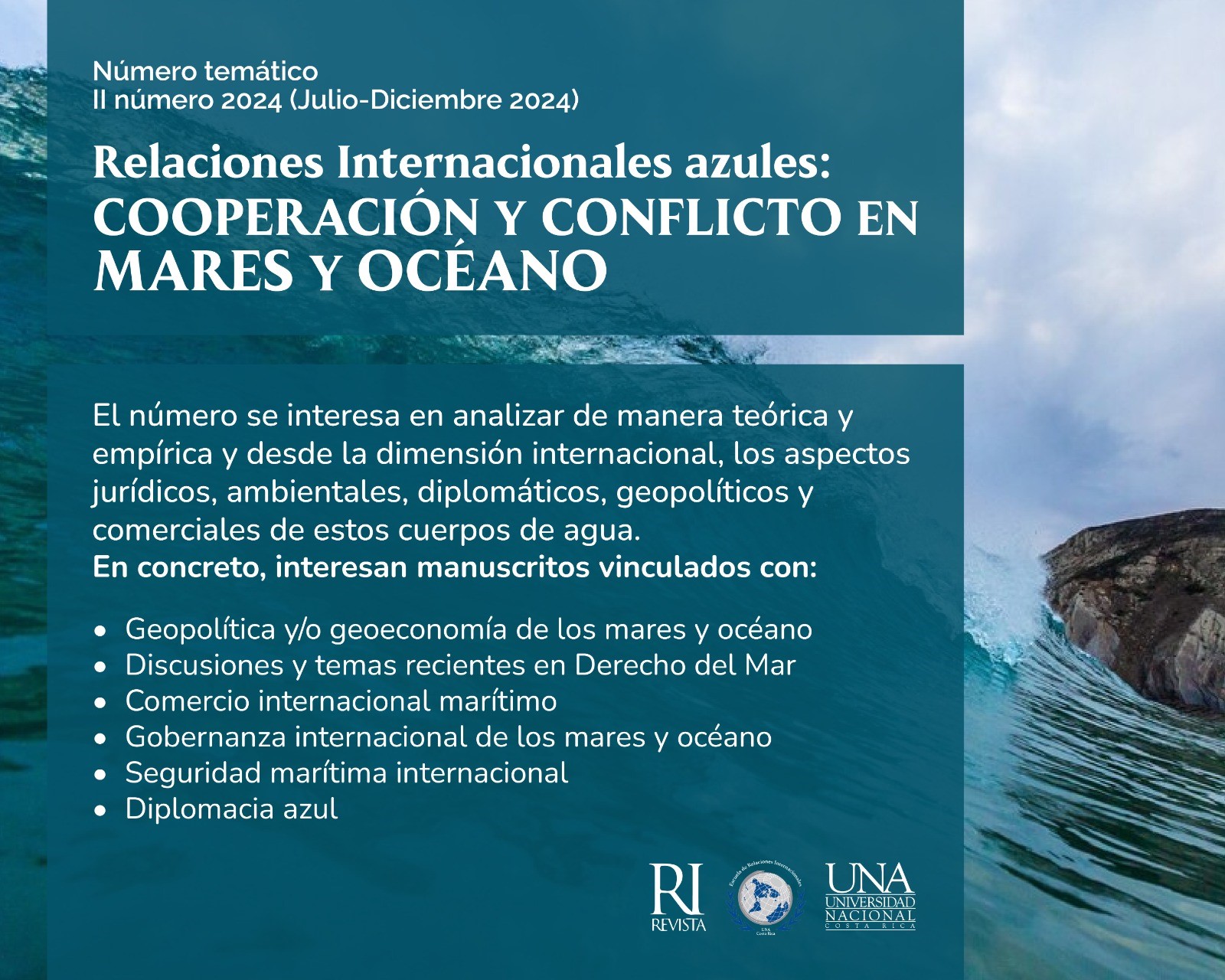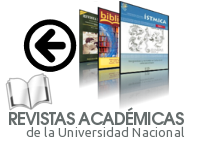La crisis de la OMC y el trilema de las negociaciones comerciales internacionales
DOI:
https://doi.org/10.15359/ri.92-1.1Palabras clave:
Negociaciones comerciales; Organización Mundial de Comercio; trilema; legitimidad; profundidad; efectividad.Resumen
El objetivo del documento es analizar la crisis que enfrenta la Organización Mundial del Comercio (OMC) para ser un foro para las negociaciones entre sus miembros. La hipótesis es que, en el contexto de una “crisis de la globalización”, se presenta un trilema en la función negociadora de la OMC. En este trilema, tres vértices, cada uno de los cuales designa una característica del proceso de negociación, no se pueden articular al mismo tiempo sino en pares, dando lugar a tres escenarios: bloqueo de las negociaciones, acuerdos light y acuerdos plurilaterales. El artículo sigue un diseño metodológico cualitativo. Se basa en una amplia revisión bibliográfica y en el análisis documental. La figura del trilema, como una forma de abordar la crisis de la OMC, permite
comprender que esta es un fenómeno intrínseco a la configuración actual del orden internacional. Además, las conclusiones apuntan al hecho de que las reformas institucionales pueden resultar un abordaje insuficiente del problema, ya que la superación de esta situación requiere de decisiones
políticas.
Referencias
Albin, C. (2012). Improving the Effectiveness of Multilateral Trade Negotiations: A Synopsis, International Negotiation, vol. 17 No. 1, pp. 1–8.
Baldwin, R. (2011). 21st century regionalism: Filling the gap between 21st century trade and 20th century trade rules. WTO Staff Working Papers ERSD-2011 08, World Trade Organization (WTO), Economic Research and Statistics Division.
Baldwin, R. (2016). The World trade organization and the future of multilateralism. Journal of Economic Perspectives, 30(1), 95–116.
Baldwin, R. (2017). The great convergence. Information technology and the new globalization. Cambridge: The Belknap Press of Harvard University Press.
Barton, J. H., and Goldstein, J. L., Josling, T. E. y Steinberg, R. H. (2008). The Evolution of the Trade Regime: Politics, Law, and Economics of the GATT and
the WTO, Princeton: Princeton University Press.
Bayne, N. (2005). Staying together: The G8 summit confronts the 21st Century, Burlington: Cornwall Ashgate Publishing.
Bellmann, C., and Hepburn, J. (2017). The Decline of Commodity Prices and Global Agricultural Trade Negotiations: A Game Changer? International Development Policy, Revue internationale de politique de développement [Online], artículo 8.1. doi: 10.4000/poldev.2384
Bouzas, R., and Zelicovich, J. (2014). La Organización Mundial de Comercio, los acuerdos mega-regionales y los usos estratégicos del regionalismo. Estudios
de Economía Aplicada, 32(3), 963-994.
Buchanan, A., and Keohane, R. (2010). The legitimacy of Global Governance Institutions. In J. Babic, P. Bojanic (Eds.), World Governance: Do we need it, Is it possible, What could it (all) mean? Newcastle: Cambridge Scholars Publishing.
Coldicott, D. (2008). The World Trade Organization, Legitimacy and the Development Problematic. Paper presented to the PhD Workshop of the Annual Bank Conference on Development Economics (ABCDE), Cape Town, South Africa, 7-8 June 2008. Available at http://siteresources.worldbank.org/INTRAD/ Resources/DColdicott.pdf
Cottier, T. (2008). The Legitimacy of WTO Law. NCCR Trade Regulation, Working Paper 19, Swiss National Centre of Competence in Research, available at http://phase1.nccr-trade.org/images/stories/publications/IP2/The_Legitimacy_of_WTO_Law_cottier_final%200808.pdf (Accessed 1 December 2017)
Daemmrich, A. (2011). The Evolving Basis for Legitimacy of the World Trade Organization: Dispute Settlement and the Rebalancing of Global Interests. Harvard Business School, Working Paper 12-041, available at http://www20.iadb.org/intal/catalogo/PE/2012/09920.pdf
Damuri, Y. (2012). 21st Century Regionalism and Production Sharing Practice. CTEI Working Papers 4, Centre for Trade and Economic Integration, The Graduate Institute, Geneva.
Gilpin, R. (2001). Global Political Economy. Understanding the international economic order. Princeton University Press.
Hays, J. (2017). Embedded Liberalism and the Populist Backlash. University of Pittsburgh. Mimeo.
Hale, T., Held, D., and Young, K. (2013). Gridlock. Why global cooperation is falling when we need it most? Cambridge: Polity Press.
Heldt, Eugenia. (2017). Shaping Global Trade Governance Rules: New Power’s Hard and Soft Strategies of influence at the WTO. European Foreign Affairs
Review, 22(Special Issue), 19-36.
Hoekman, B. (2014). Supply Chains, Mega-Regionals and Multilateralism: A Road Map for the WTO. London: CERP Press.
Hoekman, B., and Kostecki, M. (2001). The political economy of the world trading system: the WTO and beyond. Oxford: Oxford University Press.
Hofmann, C., Osnago, A., Ruta, M. (2017). Horizontal Depth. A new database on the content of Preferential Trade Agreements. The World Bank, Policy Research
Working Paper 7981.
Ikenberry, J. (2017). The plot against American Foreign Policy: Can the liberal order survive. Foreign Affairs, 96, 2-7.
Jawara, F., Kwa, A. (2003). Behind the scenes at the WTO: the real world of international trade publications. London: Zed Books.
Kahler, M. (1992). Multilateralism with Small and Large Numbers. En J. Ruggie, (Ed.), Multilateralism Matters. The theory and Praxis of an Institutional form. New York: Columbia University Press.
Keohane, R. (2006). The contingent legitimacy of multilateralism. In E. Newman, R. Thakur and J. Tirman (Eds.), Multilateralism Under Challenge: Power, International Order, And Structural Change. New York: United Nations University Press.
Low, P. (2011). WTO Decision-Making for the Future. WTO Staff Working Papers ERSD, 05. World Trade Organization (WTO), Economic Research and Statistics Division, available at https://www.wto.org/english/res_e/reser_e/ersd201105_e.pdf
Martin, L. (1992). The Rational State Choice of Multilateralism. En J. Ruggie (Ed.), Multilateralism Matters. The theory and Praxis of an Institutional form. New York: Columbia University Press.
Martin, A., Mercurio, B. (2017). Doha dead and buried in Nairobi: Lessons for the WTO. Journal of International Trade Law and Policy, 16(1), 49-66. Disponible
en http://dx.doi.org/10.1108/JITLP-01-2017-0001
Mattoo, A., Subramanian, A. (2008). Multilateralism beyond Doha. The World Bank, Policy Research Working Paper 4735.
Méndez-Coto, M. (2016), Multilateralismo, gobernanza y hegemonía en la estructura económica internacional: Del G7 al G20. Relaciones Internacionales,
, 13-32.
Narlikar, A. (2005). Bargaining over the Doha Development Agenda: Coalitions in the WTO. LATN Working Paper 36, available at http://latn.org.ar/wp-content/ uploads/2015/01/wp-36.pdf
Neufeld, N. (2014). The long and winding road: How WTO members finally reached a Trade Facilitation Agreement. World Trade Organization, Economic Research and Statistics Division, Recuperado de https://www.wto.org/english/res_e/reser_e/ersd201406_e.pdf
Obstfeld, M., and Taylor, A. (1997). The Great Depression as a Watershed: International Capital Mobility over the Long Run. NBER Working paper 5960.
OECD, OMC. (2015). Aid for Trade at a glance 2015. Reducing trade costs for inclusive sustainable growth. OECD Publishing. Available at http://dx.doi.org/10.1787/aid_glance-2015-en
OMC. (2011). Word Trade Report 2011. The WTO and preferential trade agreements: from co-existence to coherence. Ginebra: WTO press. Available at https://
www.wto.org/english/res_e/booksp_e/anrep_e/world_trade_report11_e.pdf
Pauwelyn, J., and Alschner, W. (2014). Forget about the WTO: The network of Relations between Preferential Trade Agreements (PTAs) and Double PTAs.
Graduate Institute of International and Development Studies – Social Science Research Network. Available at, http://ssrn.com/abstract=2391124 or http://dx.doi.org/10.2139/ssrn.2391124
Primo Braga, C. (2017). The Threat of Economic Disintegration. In C. Primo Braga, and B. Hoekman, The future of the Global Trade Order. European University Institute.
Primo Braga, C., Hoekman, B. (2017). Future of the Global Trade Order. In C. Primo Braga, and B. Hoekman, The future of the Global Trade Order. European
University Institute.
Rodrik, D. (2000). How far will international economic integration go? Journal of economic perspectives, 14(1), 177-186.
Rodrik, D. (2011). The globalization paradox. Oxford: Oxford University Press.
Rodrik, D. (2017). Straight talk on trade. New Jersey: Princeton University Press.
Rolland, S. (2010). Redesigning the negotiation process at the WTO. Journal of International Economic Law, 13(1), 65-110.
Rosales, O., Herreros, S., Frohamann, A., and García-Millán, T. (2013). Las negociaciones megarregionales: Hacia una nueva gobernanza del comercio mundial. CEPAL, Serie Comercio Internacional n.°121.
Stone, R. (2009). Institutions, Power and Interdependence. En H. Milner, A. Moravcsik, Power, Interdependence and Nonstate Actor in world politics. New
Jersey: Princeton University Press.
Sanahuja, J. (2016). América Latina en un cambio de escenario: De la bonanza de las commodities a la crisis de la globalización. Revista Pensamiento Propio,
(44), 13-26.
Sanahuja, J. (2018). Crisis de globalización, crisis de hegemonía: Un escenario de cambio estructural para América Latina y el Caribe. En A. Serbin (Ed.),
América Latina y el Caribe frente a un nuevo orden mundial: Poder, globalización y respuestas regionales. Buenos Aires: Ediciones CRIES (Coordinadora
Regional de Investigaciones Económicas y Sociales).
Steger, D. (2009). The future of the WTO: The case for institutional reform. Journal of International Economic Law, 12(4), 803–833.
Steinberg, F. (2007). Cooperación y conflicto. Comercio internacional en la era de la globalización. Madrid: Ed. AKAL.
Steinberg, R. (2002). In the Shadow of Law or Power? Consensus-Based Bargaining and Outcomes in the GATT/WTO. International Organization, 56(2), 339-374.
Vangrasstek, C. (2013). The History and Future of the World Trade Organization. Geneva: WTO Publications.
Vickers, B. (2013). The relationship between plurilateral approaches and the round. E15 Expert Group on Functioning of the WTO. ICTSD – World Economic Forum.
Wolfe, R. (2004). Informal Political Engagement in the WTO: Are Mini-Ministerials a Good Idea? In J. Curtis, D. Ciuriak (Eds.), Trade Policy Research 2004 Toronto: Minister of Public Works and Government Services – Canada.
Wolfe, R. (2009). The WTO single undertaking as negotiating technique and constitutive metaphor. Journal of International Economic Law, 12(4), 835-858.
Zelicovich, J. (2016). La economía política internacional en las negociaciones multilaterales de agricultura. El caso de las subvenciones a las exportaciones
agrícolas en la Ronda Doha. Revista Estudios Sociales Contemporáneos. Instituto de Estudios Sociales Contemporáneos, 14, 64-84.
Zelicovich, J. (Mayo, 2017). ¿Está viva la OMC? Bloqueos y consensos en las negociaciones de las Conferencias Ministeriales de Bali y Nairobi. UNISCI Journal, 44. Universidad Complutense de Madrid.
Zurn, M. (2018). Contested Global Governance. Global Policy, 9(1), 138-145.
Publicado
Cómo citar
Número
Sección
Licencia
Esta publicación está adscrita a Creative Commons; deben respetarse sus atribuciones y restricciones.
Los autores/as que publiquen en esta revista aceptan las siguientes condiciones:
- Los autores/as conservan los derechos de autor y ceden a la revista el derecho de la primera publicación, con el trabajo registrado con la Licencia Creative Commons Atribución-NoComercial-CompartirIgual 4.0 Internacional, que permite a terceros utilizar lo publicado siempre que mencionen la autoría del trabajo y a la primera publicación en esta revista.
- Los autores/as pueden realizar otros acuerdos contractuales independientes y adicionales para la distribución no exclusiva de la versión del artículo publicado en esta revista (p. ej., incluirlo en un repositorio institucional o publicarlo en un libro) siempre que indiquen claramente que el trabajo se publicó por primera vez en esta revista.
- Se permite y recomienda a los autores/as a publicar su trabajo en Internet (por ejemplo en páginas institucionales o personales) antes y durante el proceso de revisión y publicación, ya que puede conducir a intercambios productivos y a una mayor y más rápida difusión del trabajo publicado.
Revista de Relaciones Internacionales por Universidad Nacional de Costa Rica está bajo una Licencia Creative Commons Atribución-NoComercial-SinDerivar 4.0 Internacional









.png)



2.png)
